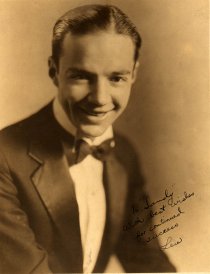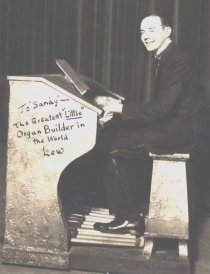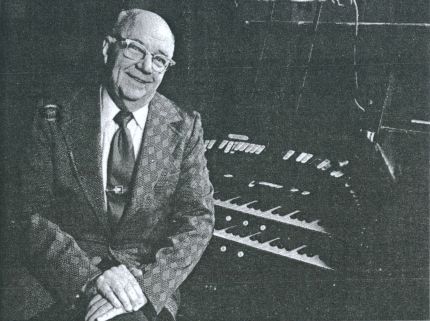


Lew Wells
Back to the Northwest Organists page
Bremerton, WA


Lew Wells was a popular organist from the Bremerton area. He played many theatres around the Northwest including several in Idaho and Montana. Lew also worked for Balcom & Vaughan and was close friends with Sandy Balcom.

Lew Wells at the Bremerton Community Theatre Wurlitzer, 1977
Back At The Pipes Again
By Max Kvidera, Sun Staff Writer
Bremerton Sun Friday October 21, 1977
Next week 74-year-old. Lew Wells will be reunited with an old friend.
He’ll sit down in front of the console of the Wurlitzer unit orchestra pipe organ at Bremerton Community Theatre.
And he’ll begin playing the same instrument be played more than 50 years ago in a silent movie house in Pasco.
Wells’ former profession as the organist for silent movies will be resurrected next weekend at the theater. He and John Nafie, who works at Armstrong Piano and Organ, will play background music for four performances of the original version of The Phantom of the Opera.
The Lon Chaney classic will be screened nightly at 7:45, with a 10:45 late show on Saturday.
Proceeds from the film will go to the building funds of the theater and the Bremerton Pipe Organ Society. Its members bought and are installing the massive organ in the theater.
Except for a special performance at a silent film screening in Idaho in 1969, Wells hasn’t played at the movies since recorded sound arrived. He recalls playing for his last film in about 1931.
"The talkies took over and wiped us all out," Wells says. "I was one of the last ones to get out of the organ theater business. I was assistant manager at the theater toward the end. I took tickets and played the organ."
Before sound movies began appearing in 1927-28, there were at least 135 theater organists in the Seattle area alone, he recalls. Their jobs were eliminated in the space of a few years as films started being made with recorded music tracks.
Even in those early years, a few organists clung to their jobs.
"They weren’t sure of the early sound equipment so I had to stay close to a telephone in the theater in case the sound broke down," he says.
His first theater job was at the old Apollo Theater in West Seattle in 1922, when he got union wages of $30 a
week. He performed primarily in suburban and small town theaters in Pasco, Longview, Seattle, Tacoma and Spokane. He finally made it to the big downtown theaters when the talkies emerged.
A typical week for Wells in those days was playing 7-11 p.m. Mondays through Saturdays and 2-11 on Sundays, six days a week. He played music for newsreels, comedies, "scenics," two features a night and the "spill" time between showings, often alternating with another organist.
Most of the movies were shipped with "cue sheets" that carried musical instructions for the organist. The sheets indicated spots in the movie where music should be played and suggested melodies for each occasion. For major "road shows" -- big films shown in theaters rented by the distributors -- complete scores, cued and timed, were provided.
But on many occasions, the clever organist could improvise and become as much an entertainer as the actors on the screen. Wells says the organist would "feel the crowd" and "throw himself into the mood of the picture" by adapting the music to fit the film.
"If you were a good organist, people wouldn’t notice you," he says. "You would become part of the picture."
Alter the theater days dried up, Wells organized amateur talent acts and emceed shows in Seattle. Later, he helped build organs for Balcom and Vaughan in Seattle, including the one being installed at the Bremerton theater.
He toiled in the Seattle and Tacoma shipyards during the war, but disliked it and was later hired to service Pullman railcars. He played organ at a Renton roller rink, sold organs and pianos and worked in Bremerton sheet music and piano stores after the war.
Wells at one point wanted to teach physical education, and never planned to follow in his father’s footsteps as a performer. His father, "Lew Wells -- Monologue and Saxophone Eccentricities" -- played in vaudeville, and Wells junior had been in all the states and the British Isles by the age of three.
"I was raised in a trunk -- sleeping in bureau drawers in hotels," he says. "I always swore I wouldn’t get into show business."
Wells is back in show business in Bremerton because of the efforts of the Bremerton Pipe Organ Society and
the community theater. Seventeen of the society members bought the organ last fall for $3,500, after the death in Seattle of a well-known organist and organ repairer.
The men took apart the 12-rank (rank is a series of organ pipes) organ and carted it to Bremerton. The reassembly, an exhaustive process, will be only about one-third finished for the filming next week.
Originally built as a four-rank instrument, the organ is operated through a complicated system using magnets, relays, wires and key switches. In addition to the customary pipes encased in wooden wind chests, the organ is equipped with chimes, glockenspiel, xylophone, harp, two sets of drums and the "barnyard riot" sound effects of train and bird whistles, door bells, gongs, horns and castanets.
This musical menageries eventually will be connected via 600 wires to the console in front of the theater
stage.
About this site © PSTOS, 1998-2004